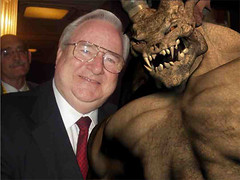Andrew Sullivan writes:
the notion that Falwell's past, Dobson's current political clout and the "Left Behind" series' success do not capture something important about "the religious and political currents in modern America" today is preposterous. For David [Brooks] to deny this says much more about his blindspots than about America.
Sullivan is right: Brooks has this weird tic that causes him to repeatedly deny that the most powerful Christian political leaders in the country are actually nothing more than individuals who the left likes to stereotype. His evidence? People who aren't these guys and don't get involved in politics sell books, and command theological respect. Indeed, there's an advancing effort to blunt criticism of Falwell, Robertson, and Dobson by emphasizing the vastness of the evangelical movement and underscoring its stubborn resistance to stereotyping. Sullivan, I think, deals with that one well:
Falwell may indeed no longer be a central figure in American Christianism. But he was a critical early force in building the movement that now runs the GOP, along with Pat Robertson. You cannot narrate the emergence of the new Republicanism (in which Brooks played a part), as I do in the book, without mentioning Goldwater's nemesis. As for Dobson, his influence is indisputably enormous. Last year, Dobson's group spent $150 million on spreading its message. Dobson's estimated listening radio audience is in the tens of millions a day (some claim 200 million), and his multi-media complex in Colorado Springs is so vast it has its own zip-code. The president vets Supreme Court nominees through him. This is irrelevant to what has happened to conservatism in the last decade? Please.
Maybe, in a vacuum, Falwell, Robertson, and Dobson are powerless. But so long as they control massive amounts of money, reach massive numbers of Americans, and fool the great majority of the GOP to believing in their importance, they're important.
 Andrew Sullivan
Andrew Sullivan 


